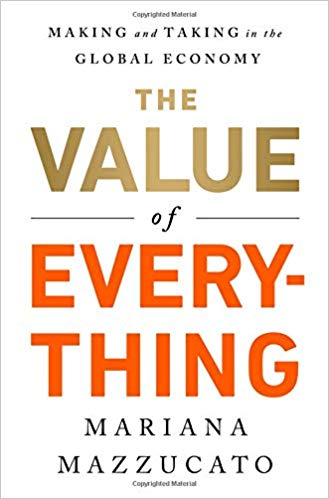Two weeks ago, Andy Miller of our group here in the AMS Policy Program DC office suggested we should all give a listen to Freakonomics radio episode #348, dated 9/6/18. What great advice! So, paying it forward. We all should want to listen and learn.
Perhaps a couple of snippets from the transcript of the interview will whet your appetite:
We all know the standard story: our economy would be more dynamic if only the government would get out of the way. The economist Mariana Mazzucato says we’ve got that story backward. She argues that the government, by funding so much early-stage research, is hugely responsible for big successes in tech, pharma, energy, and more. But the government also does a terrible job in claiming credit — and, more important, getting a return on its investment…
Mazzucato’s latest book is called The Value of Everything: Making and Taking in the Global Economy. When it comes to the relationship between government and economic growth, Mazzucato knows how the popular narrative goes. It goes like this:
MAZZUCATO: “My God! The government, what a basket case. A group of bureaucrats. They don’t know what they’re doing!”
But she sees it differently:
MAZZUCATO: You know, what would Uber be without GPS, publicly financed? What would Google be without the Internet, publicly financed?
Today on Freakonomics Radio: in the modern economy, are governments the ones who are getting a raw deal?
MAZZUCATO: Today, all the discussion is about getting the state out of the way, completely ignoring the fact that these government investments were critical for innovation to happen.
And, when you look at big, rich sectors of the economy like finance and pharmaceuticals — how much value are they really creating?
MAZZUCATO: We have to make it much more difficult for different actors in the economy to call themselves wealth creators without really being asked, “Well, are you, or are you not?”…
… So to someone who says,“Free markets are almost always good, and governments are almost always bad,” you say what?
MAZZUCATO: The first is,“What do you mean by the free market?” And it’s curious, if you read Adam Smith, one of the first economists back in the late 1700’s, he actually meant by the word “free market” not free from the state, but free from rent-seeking, free from those activities that extract value. So what I say to those who say that we need less state in order to be more innovative, more dynamic, I say, “Let’s look at one of the most innovative parts of the U.S. economy, which is Silicon Valley. Did that come from the free market or from an active, visible hand: the state?” My point is, actually, the state was involved in almost everything in Silicon Valley. Not to exclude the role of the private sector, of course — we all know the very important companies in that area. But the role that public actors played was really across the whole innovation chain.
DUBNER: Now we’re talking about agencies like DARPA and NASA and the National Institutes of Health and so on, yes?
MAZZUCATO: Exactly. I’m talking about both agencies that do basic research like the National Science Foundation. But also agencies more downstream, doing applied research like DARPA but also its sister organization, in more recent times, called ARPA-E. The National Institutes of Health, which continue to spend more than $30 billion a year in the most radical, uncertain, high-risk research.
Hopefully, at this point you want to read, hear, and learn more. With any luck, you’re also seeing connections to the public-private partnership that lies at the foundation of the Weather Enterprise. One aspect of this partnership familiar to LOTRW readers is the routine, day-to-day collaboration that develops meteorological intelligence and delivers that intelligence to the multiple publics who need it. Hurricane Florence provides a recent case-in-point. Public agencies and the private-sector were jointly responsible for collecting the observations, doing the numerical weather prediction, and disseminating the information. Emergency managers and public officials communicated risk and desired actions to the general public. State Departments of Transportation temporarily reconfigured roadways to speed evacuation. Utility operators – the power companies, water and sewage managers, and others, took measures to reduce disruption of vital services and speed restoration of service as the hazard passed. State and federal environmental protection agencies looked at special problems posed by hog lagoons and coal-ash storage – facilities and functions that threatened pollution hazards downstream if and when surmounted by floodwaters.
Ms. Mazzucato’s focus is a bit different – it’s on the public sector’s vital role fostering the higher-risk initial steps in innovation. Given the rapid evolution in provision and use of weather services, healthy, vibrant partnerships in R&D and the transition of advances into services will continue to be important to the Weather Enterprise for the foreseeable future.

This subject is important enough to all of us that you might want to assign yourself a grade. For reading this far, give yourself a C. If you click on the Freakonomics website and speed-read/skim the interview transcript, you earn a B. Listen to the interview – savor the full half hour – and you’ll be more than rewarded for your A. For extra credit, you might tackle Ms. Mazzucato’s full book, The Value of Everything: Making and Taking in the Global Economy[1]. I’m reading it now…
______________________________
[1] Here’s a book review from The Financial Times.
